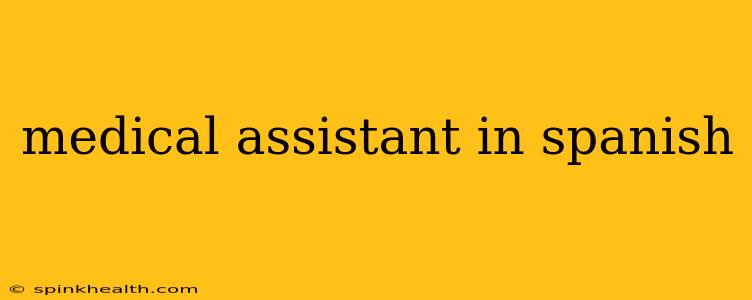The term "medical assistant" doesn't have a single, universally accepted translation in Spanish. The best choice depends heavily on the context and the specific duties of the medical assistant. Think of it like trying to translate "lawyer" – it could be abogado, notario, or even fiscal, depending on their specialization. Let's unravel this, exploring different options and situations.
What are the Different Spanish Translations for "Medical Assistant"?
This is where the storytelling begins. Imagine you're a healthcare recruiter, needing to post a job description. Or maybe you're a patient trying to explain your appointment to a family member. The best word hinges on the nuance.
Here are some key options, along with when they're most appropriate:
-
Auxiliar de enfermería: This is probably the most common and widely understood translation. It literally means "nursing assistant," and often encompasses many of the tasks a medical assistant performs, especially those related to patient care. This is a safe bet in most scenarios. Think of it as the broad stroke—it covers a lot of ground.
-
Auxiliar médico: This translates to "medical assistant" directly, and is a good option when the job description emphasizes administrative tasks or general support to a physician. If the role is more administrative, this could be the better choice.
-
Técnico en atención médica: This term, meaning "medical care technician," suggests a higher level of training or specialization. It's more accurate if the assistant has a more advanced skillset and qualifications, such as phlebotomy or EKG interpretation. This is for those with more specialized training.
-
Asistente médico: A more formal and direct translation, it emphasizes the support role to the physician. It might be appropriate in a more formal setting, such as a hospital or clinic.
How to Choose the Right Translation?
The choice hinges on several factors:
-
The Specific Job Duties: Does the role heavily involve patient care (suggesting auxiliar de enfermería)? Is it largely administrative (perhaps auxiliar médico)? Or does it require specific technical skills (técnico en atención médica)?
-
The Geographic Location: While these terms are widely understood, regional variations exist. Consulting with a native speaker familiar with the local healthcare system is always advisable.
-
The Context: Are you writing a job posting, a patient explanation, or something else? The appropriate level of formality changes the word choice.
What About Specific Tasks? How are they Described?
This is where precision becomes crucial. Let's say you need to describe specific tasks, such as taking vital signs or assisting with examinations. Then you'd use descriptive phrases like:
- Tomar signos vitales: Taking vital signs
- Ayudar con los exámenes: Assisting with examinations
- Realizar tareas administrativas: Performing administrative tasks
- Preparar a los pacientes para procedimientos médicos: Preparing patients for medical procedures
- Registrar información del paciente: Recording patient information
Frequently Asked Questions (FAQs)
What's the difference between auxiliar de enfermería and auxiliar médico?
The primary difference lies in the emphasis. Auxiliar de enfermería often highlights patient care responsibilities, while auxiliar médico focuses on broader administrative and support tasks for the physician. The overlap is significant, however.
Is there a single perfect translation?
No, there isn't one perfect translation. The best choice depends entirely on the context and the specific duties of the medical assistant.
How can I be sure I'm using the correct term?
When in doubt, consult a native Spanish speaker familiar with the healthcare system in the specific region.
This nuanced approach ensures clarity and accuracy when discussing medical assistants in Spanish. Remember, context is king!

